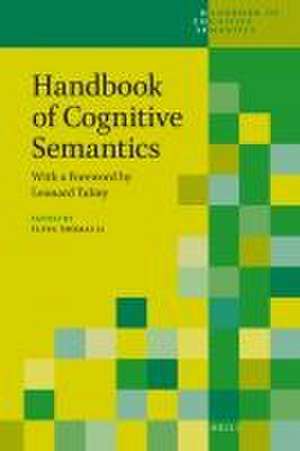Handbook of Cognitive Semantics (4 parts): Brill's Handbooks in Linguistics
Fuyin Thomas LIen Limba Engleză Carte – 28 feb 2024
The handbook consists of four volumes:
Volume 1
Part I: Conceptual Semantics
Part II: Basic Issues
Volume 2
Part III: Essential Concepts
Part IV: Semantic Categories
Part V: Methodology
Part VI: Models and Schemas
Volume 3
Part VII: Space and Time
Part VIII: Event Typology
Part IX: Meaning Construction
Volume 4
Part X: Force and Causation
Part XI: Attention
Part XII: The Targeting System of Language
Index
Preț: 4409.42 lei
Preț vechi: 5377.34 lei
-18% Nou
Puncte Express: 6614
Preț estimativ în valută:
843.84€ • 916.29$ • 708.83£
843.84€ • 916.29$ • 708.83£
Carte disponibilă
Livrare economică 03-09 aprilie
Preluare comenzi: 021 569.72.76
Specificații
ISBN-13: 9789004698925
ISBN-10: 9004698922
Greutate: 0 kg
Editura: Brill
Colecția Brill
Seria Brill's Handbooks in Linguistics
ISBN-10: 9004698922
Greutate: 0 kg
Editura: Brill
Colecția Brill
Seria Brill's Handbooks in Linguistics
Notă biografică
Fuyin Thomas LI, Ph.D. (2003), The Chinese University of Hong Kong, is Professor of Linguistics at Beihang University, Founding Editor of the journal Cognitive Semantics, Series Editor of Distinguished Lectures in Cognitive Linguistics, and organizer of the China International Forum on Cognitive Linguistics (CIFCL) and ICLC-11. He proposed the Macro-event Hypothesis.




